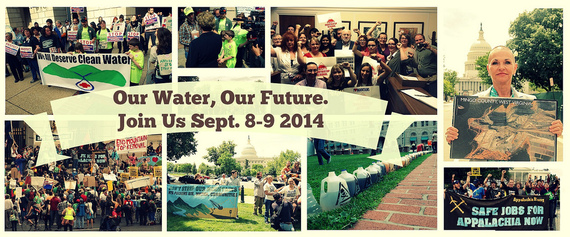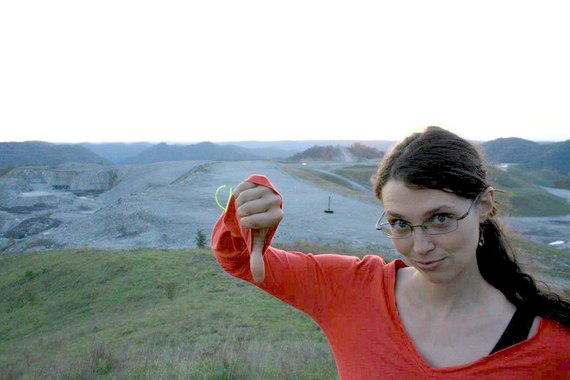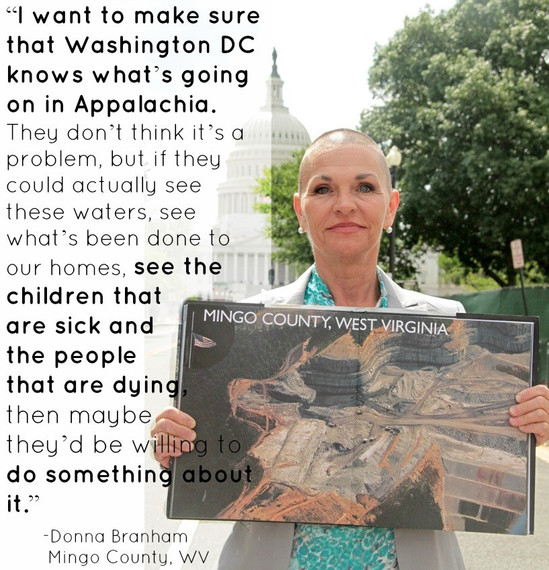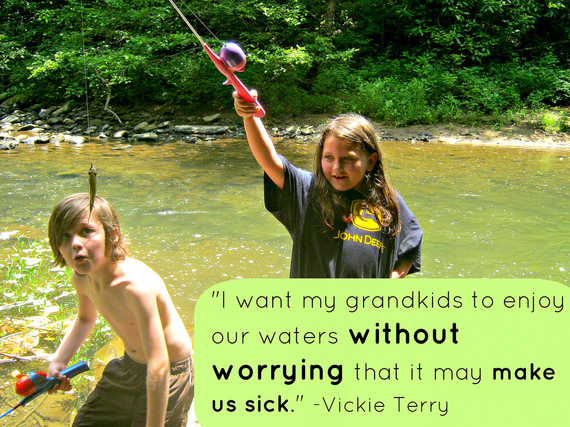I am very excited to share this interview with Dana Kuhnline, a 9-year activist in the fight against mountaintop removal in Appalachia. Dana is currently the media coordinator at the Alliance for Appalachia - and is in charge of running the social media efforts for the biggest coalition in the region. We chat about Dana's background, stories from organizing in coal country, and lessons from recruiting stories in a place that is rich in storytellers. Also: get ready for Dana's sneak preview of the Alliance for Appalachia's next major event in DC - "Our Water, Our Future (Sep 8-9th)."
Where did you grow up? What did your backyard look like?
I grew up near the Mississippi river in the rural midwest, with corn and soy growing to the horizon, in a conservative family that loves coal. I read a lot of books and built a lot of forts out of cornstalks.
What was a moment from growing up--a particular moment or experience-- that sticks out as one that helped take you down the path of coming after justice?
I have family members with physical disabilities. Seeing them being treated unfairly because of being differently abled as well as low income was just part of everyday life. From not receiving proper health care to just stupid stuff, all the time, like my brother not getting a basketball during gym class because they were worried about insurance liability. So we bought him one ourselves for him to play with in gym class. Shame on them.
It was clear to me at a young age that most 'authorities' are lazy and won't help people unless they are forced or shamed into doing the right thing. The other thing I learned early about justice is that you really have to pick your battles when your whole life is a battle ground. I think people in privilege judge marginalized people for "putting up" with certain injustices (i.e. "I would NEVER let that happen in my community!"), but if you have a life to live and a family to love, you are going to have to let some things go. I think there's dignity in that choice and respecting people's choices NOT to act sometimes - not to downplay the healing power of collective action!
You spent a number of years in West Virginia and elsewhere in Appalachia and working to build the movement against mountaintop removal coal mining in the heart of coal country. Tell us about a moment working in West Virginia. Specifically, tell us about a moment when you felt like you were totally out of hope. What happened?
A single moment? An obvious choice was a tense public hearing in 2009 that had a huge pro-coal mob outside (the Army Corps Nationwide 21 Permit Hearing). I had to go through the mob (to get my car keys) and got shoved and hit by a woman HOLDING A BABY - she shoved me WITH THE BABY. I was just so flabbergasted, all the fear left me. How do you move forward as a community from a level of fear and desperation so intense that people are physically using babies as weapons? When the main reason I got involved in fighting mountaintop removal was to protect children's health. And I don't want people to judge this woman; she was put in a terrible position and did something terrible -- that is what oppression does to us all sometimes. I tell the story to point out the system that very deliberately created this situation.
Also I was dressed up very nice in a suit, but wore a button that gave me away as a tree-hugger, and everyone kept telling me to wash my hair, take a bath, etc. My hair looked very clean, but that's not the point, it was just, people didn't see me at all, but the lie they were told, that I was the dangerous one, and that was more comfortable than the truth - that coal is just running out. Whether or not I wash my hair ever again, we have to transition the Appalachian economy.
You asked about hope. To be honest, hope isn't something I fuss about. To me, whether we win or lose (and we will do both) my priority is to do that with dignity.
The Alliance for Appalachia is getting ready for its big annual mobilization in DC - with a focus on protecting water. What inspired this event, and what should we expect to see in DC?
Yes! Thanks for asking! Water is such a big issue in Appalachia - it's a temperate rainforest, but people struggle for access to water! People have been dealing with poisoned water for DECADES, and the health issues and family struggles are too heartbreaking to put words to. But, people are resilient and have so much power in the region. We want to build a sustainable future beyond coal, and there are so many brilliant people with the skills to do that. But in some communities, 25% percent of the land and literally thousands of miles of streams have been destroyed by coal mining. That's a big toxic hurdle that needs dealt with. So we need the coal companies to first stop destroying the land and then take some responsibility to clean up their mess as we move forward.
The Our Water, Our Future event is making that link between environment, health, and building a healthy Appalachian future that can weather the storms of climate change.
Of course we have a number of very specific policy asks for the EPA and the Obama administration to take some basic, LONG overdue steps to protect Appalachian water. It's very, very wonky, and very, very savvy and completely led by community experts who know what changes they need to protect their land. I swear, the grannies in our movement know way more about wonky mining policy than any EPA staffer!
What's one way you're most excited to be using social media or meme slinging to get out the word in the lead up the "Our Water, Our Future" action?
In the lead up, the focus of our memes in building up for this action are how important water is to Appalachian culture and making connections to people across the US who are also struggling for access to clean water, from Detroit to droughts in California.
Our question was, "Why do you fight for water?" and the photo responses people have gifted us with are so personal and powerful to me.
Over the last few weeks and months, you've done an exceptional job profiling Appalachians and their connections to water. Appalachians, from my experience, hold some of the most powerful unique voices in our movement, but also are some of the most humble, and perhaps reticent to be in the spotlight. What's your secret (or 2-3 secrets) for recruiting folks and convincing them (so to speak) to be spotlighted through social media and memes?
First, it is a big risk to speak out and let your image be used if you are living in an area where industry is causing fear and intimidation. So I like to offer people to be anonymous or just use their first name. To me, the point is the story, not their last name.
After that, I try to be clear what the point of the interview is, how the image will be used, and how I think it will help the work move forward, so they are an equal and informed partner in the process.
And a third tip is, it's hard to get people to move out of soundbites, so you have to really work on your questions! But I'm aware too that it's exhausting and can feel exploitative to expose your personal - yet political - trauma every damn day to privileged strangers, so I don't push too hard. I try to find a balance where people can speak from a place that is personal and shows their strength and resiliency. Generally that starts with questions about kids. :)
We have a number of powerful storytellers in Appalachia who are from here (indeed we have whole magazines like Oxford American dedicated to our bards), although in the environmental movement in the region, sometimes it feels like we don't have enough social media wired storytellers, or they are more transient, or the work is delegated to interns (with a number of exceptions, like yourself, Dustin White at OVEC, and like whoever is rocking out at AppVoices). How do you feel about this assessment? How do you think we can recruit more Appalachian social media storytellers? What are some ideas you may have bubbling or that come to mind for sparking and training the next generation?
Storytelling is an amazing part of Appalachian culture! If you haven't been to a Liars Competition you are sure missing out! But part of many of the best tales is the slow build, audience interaction, a rooted sense of place and a strong family and heritage context - and that's a lot to fit in a meme. My guess is many cultures with a strong oral tradition don't "meme" very naturally. In a more rural setting, you have more time to talk and you take more time to say things, and say them the way you mean it, if you will. To be clear, I'm not from Appalachia and don't want to speak for the region, but that's my own experience living there.
As far as getting new people telling stories through memes? I think encouraging people to take time to say something and then listening to them say it is a pretty big start. That's a lot harder than it sounds though. I mean, really, it's the hardest thing in our fast paced activist culture. We're like, "Do you know how to do this? Who cares just DO IT IN FIVE MINUTES THE ACTION ALREADY STARTED!" Ha! It's not a great way to authentically integrate in new leadership that respects an individual's cultural strengths. I'm as guilty of it as the next person, but it's something I'm trying to be more aware of.
I don't quite mean to box you in a social media maven - you wear many other wonderful hats too! You also are an Arts Trainer and have led or co-led the arts training teams at Greenpeace's revitalized Direct Action Training Camps. Can you talk about what draws you to art and why you think our movement needs to embrace art and creativity more? Do you mind sharing what specific activist art mediums you especially love training folks in?
I like anything accessible and cheap that tells a story. I especially like action visuals that lift up the voices we don't normally hear from. I love working with cardboard and DIY stencils and screenprinting because it's SO CHEAP and accessible. I don't use a lot of tools for action visuals that cost more than $5.
That's one thing that draws me to it - action arts can be accessible across many boundaries, and they are way to get our message out; to share our vision. But don't take my word for it, ask any 5 year old why the arts are important. Kids get it.
I come from a craft background, not at all a fine art background. Crafts were accessible and fun and something you did with your grandma. And I think of action visuals as more of a community craft as well - some people do take to it more naturally, but it is a community project and should be inclusive. If only because that banner hanging over the rally is speaking for everyone standing under it. That's a lot of responsibility.
How do you see the connection to the more tangible art world where you can cut and paint and mush things with your hands and get all messy to the world of digital arts - where the keyboard & mouse are more your tools? What can one learn from the other?
Well, in an ideal situation building art together builds our community. Physical arts can do that by creating awesome spaces where people work together. But the reality many crafters and artists will tell you is that there are many, many miserable lonesome moments at 5 am where you're by yourself with the duct tape and a broken puppet, and then you realize the puppet won't even fit in the car to go to the rally with or it doesn't show up in any of the pictures...
The same with on-line visuals - they can be lonely and alienating, since you're almost always working alone and then most people are just sitting alone at home looking at them, right? But at their best they inspire people and make us feel like we're all a part of something bigger than ourselves that is powerful and winning.
And I always say in my workshops, when you make physical art, you are also making it for the internet. Yes, the 50 (or 50,000) people at your rally need it, but it lives forever on-line. BUT ONLY IF YOU GET A DECENT PICTURE. I can't say that enough! I wish there was a bigger caps lock for me to communicate that in so it would really be clear :) Maybe I should make a meme that says GET DECENT PICTURE FOR INTERNETS...
You mention in your Waging NonViolence bio that you like great jokes. You got one for us? ;-)
Emmy Lou Harris told this one at a concert: "Penguin walks into a bar and says, Have you seen my brother?" Bartender says, "I dunno, what does he look like?"
Check out 3 examples of Dana Kuhnline's Alliance for Appalachia Memes below:

This collage in particular was interesting. I've been a part of the fight to end mountaintop removal for about 9 years - and I wanted to create a call to action that included pictures from years of actions in DC for our upcoming DC action.
I like memes with kids. Not just because kids are cute and emotionally manipulative either! Kids are smart and get truths and injustice in a way that adults are too jaded to see and admit. I always say, have faith like a child when grown-ups try to complicate issues: “This is wrong, we have to stop it, so we will just find a way.” Plus if we don’t get it together these kids are going to clean up the mess, so of course they should get an opinion.
Well, that concludes Dana's amazing interview! If you're inspired, make sure to get to the 'Our Water, Our Future' event on Sep 8-9th. And if you're looking for more interviews with environmental organizers who are using the power of stories and social media to create real community change - check these out.


